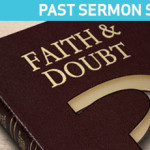We run our website the way we wished the whole internet worked: we provide high quality original content with no ads. We are funded solely by your direct support. Please consider supporting this project.
Revelation 17:8 refers to people whose names haven’t been written in “the book of life from the creation of the world.” Doesn’t this conflict with open theism?
As in Revelation 13:8, the clause “from the foundation” (apo kataboleis) need not mean “from before the foundation” but simply “from the foundation” (= since the foundation). It’s not that names either were or were not written in the “book of life” before they were ever born. Rather, throughout history, in response to the choices people made, God either wrote or omitted their names from the “book of life.” The fact that names may be blotted out even after they’ve been included (Exod. 32:33; Rev. 3:5, cf. Rev. 22:18) further suggests this “book of life” is not eternally written in stone.
Category: Q&A
Tags: Bible, End Times, New Testament, Open Theism, Q&A, Responding to Calvinism, Revelation
Topics: End Times, Providence, Predestination and Free Will, Responding to Objections
Verse: Revelation 17
Related Reading

God’s Regrets and Divine Foreknowledge
One aspect of the portrait of God in Scripture that suggests the future is partly open is the fact that God sometimes regrets how things turn out, even prior decisions that he himself made. For example, in the light of the depravity that characterized humanity prior to the flood, the Bible says that “The Lord…

What is the significance of Ezekiel 33:13–15?
“[W]hen I say to the righteous he will surely live, and he so trusts in his righteousness that he commits iniquity, none of his righteous deeds will be remembered…he will die. But when I say to the wicked, ‘You shall surely die,’ and he turns from his sin and practices justice and righteousness, if a…

Why do you claim that everybody, whether they know it or not, believes that the future is partly open?
Whatever a person may theoretically believe, they act like the future is partly open. For, as a matter of fact, there’s no other way to act. Think about it. Every time we deliberate between options on the way toward making a decision, we assume (and we have to assume) that a) the future consists of…

How do you respond to Genesis 3:15?
The Lord promises that he will “put enmity between you [the serpent] and the woman, and between your offspring and hers; he will strike your head, and you will strike his heel.” This is commonly considered the first messianic prophecy of the Bible. What a glorious and gracious picture of God we are given here!…

Past Sermon Series: Faith & Doubt
Faith is sometimes understood as the lack of doubt. As a result, doubt can be seen as the enemy of faith. But Biblical faith can withstand doubt and even be strengthened by it. God wants His people to wrestle with Him on the things that matter in their lives. We must not be afraid of struggling with deep…

The God Who Over-Knows The Future
God perfectly knows from all time what will be, what would be, and what may be. He sovereignly sets parameters for all three categories. His knowledge of what might occur leaves him no less prepared for the future than his knowledge of determined aspects of creation. Because he is infinitely intelligent, he does not need…
